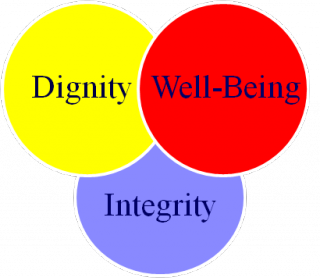Henriques writes...#readingthroughProverbs to reset our moral compass. pic.twitter.com/inYjiwhSBb— Jerome Barber (@revarkbldr) January 26, 2018
I believe we should return to teaching moral values, and engage in an active search for values that can guide the construction of greater societies. In my own quest for ultimate justifications that transcend time and context, I have found three separate but interrelated values that together feel like they offer a strong grounding in guiding my life and moral decisions. They are dignity, well-being, and integrity.

Source https://cdn.psychologytoday.com/sites/default/files/styles/article-inline-half/public/blogs/82191/2012/01/86612-82412.png?itok=K-xBPV7G
The diagram for a moral compass decision model may be quite complex.
This diagram from the Wikipedia commons is very detailed.
Richard Tarnas asks how can it be possible to construct a moral compass that can give the same north reading for all members of society.
“There is an appreciation of the plasticity and constant change of reality and knowledge, a stress on the priority of concrete experience over fixed abstract principles, and a conviction that no single a priori thought system should govern belief or investigation. It is recognized that human knowledge is subjectively determined by a multitude of factors; that objective essences, or things-in-themselves, are neither accessible nor positable; and that the value of all truths and assumptions must be continually subjected to direct testing. The critical search for truth is constrained to be tolerant of ambiguity and pluralism, and its outcome will necessarily be knowledge that is relative and fallible rather than absolute and certain” (The Passion of the Western Mind, p. 395–396). How can it be possible to construct a moral compass that can give the same north reading for all members of society when the mainstream belief of the population is that knowledge is endlessly evolving—that actions and beliefs must of necessity be fluid and adaptable to society’s changing popular culture?
Trevin Wax cites Jonathan Haidt’s book, The Righteous Mind: Why Good People are Divided by Politics and Religion that provides a crash course in the psychology of human morality.
Haidt compares the righteous mind to a tongue with six taste receptors:
liberty
loyalty
authority
sanctity
harm
fairness.
Politicians on the right tend to activate more of the receptors, while politicians on the left focus on harm and fairness as the dominant moral considerations. Haidt thinks the left should broaden their view of morality so that it encompasses more aspects.
Authors Ioanna V. Papathanasiou, Christos F. Kleisiaris, Evangelos C. Fradelos, Katerina Kakou, Lambrini Kourkouta stress the need for critical thinking for nursing students.
Nursing students in order to learn and apply critical thinking should develop independence of thought, fairness, perspicacity in personal and social level, humility, spiritual courage, integrity, perseverance, self-confidence, interest for research and curiosity. Critical thinking is an essential process for the safe, efficient and skillful nursing practice
Leah McClellan is a writer and dedicated to peaceful living. She offers a strategy Some of the direction points on my compass look like this:
- Respect others no matter who they are and expect the same from them
- Be helpful to others and to ask for help when I need it
- Honor promises and obligations, and apologize when I can’t do so
- Stick with honesty and expect the same from others
- Acknowledge, validate or say thanks – whether in person or online
- Assume goodness in others and know they’re doing their best
- Remove myself when someone’s best isn’t in my best interest
A moral compass practice for information gathering for a moral decision might use the following steps.
- Take time to seriously consider the opposite choice. (i.e. Eat the cake or don’t eat the cake).
- Evaluate the benefit to self and the benefit to others of first choice. (i.e. Eat the cake)
- Evaluate the benefit to self and the benefit to others of opposite choice. (i.e. Don’t eat the cake)
- Chose the option that offers the greatest benefit to others.
Step four in the plan is the most difficult. Many would argue that it is counter cultural. If the counterculture it supports is empathy, compassion, charity, and caring concern then the difficulty is shifted to justifying the narcissistic and self centered culture of today.
- Abortion. Compare the benefits to self and others of choosing abortion or not choosing abortion.
- Capital Punishment. Compare the benefits to self and others of choosing capital punishment for criminals or not choosing capital punishment for criminals.
- Assisted Death. Compare the benefits to self and others of choosing assisted death or not choosing assisted death.
This is an iterative process. The point of view that you have when you begin the process will likely produce lots of benefits for your initial position. Interaction with the benefits described for the alternate position is necessary to affirm your dignity, well-being, and integrity as you attempt to critically weigh both sides before you take your decision. Social media may provide a forum where the benefit calculus in the process can be shared.
References
(2012, January 31). Finding Our Moral Compass | Psychology Today. Retrieved January 26, 2018, from https://www.psychologytoday.com/blog/theory-knowledge/201201/finding-our-moral-compass
(2017, January 3). File:Revised NPOV political chart.jpg - Wikimedia Commons. Retrieved January 26, 2018, from https://commons.wikimedia.org/wiki/File:Revised_NPOV_political_chart.jpg
(2007, August 17). Ethics and Morality: The Moral Compass - Vision.org. Retrieved January 26, 2018, from http://www.vision.org/visionmedia/ethics-and-morality-moral-compass/3574.aspx
(2014, December 3). Our Moral Compass Is Turned Toward Self-Righteousness. Retrieved January 26, 2018, from https://www.thegospelcoalition.org/blogs/trevin-wax/our-moral-compass-is-turned-toward-self-righteousness
(2014, August 21). Critical Thinking: The Development of an Essential Skill for Nursing .... Retrieved January 26, 2018, from https://www.ncbi.nlm.nih.gov/pmc/articles/PMC4216424/
(n.d.). 5 Crucial Reasons to Carry a Moral Compass - Goodlife Zen. Retrieved January 26, 2018, from https://goodlifezen.com/5-crucial-reasons-to-carry-a-moral-compass/
(n.d.). 15 Signs Of Self-Absorbed People - Lifehack. Retrieved January 26, 2018, from https://www.lifehack.org/325656/15-signs-self-absorbed-people-2
No comments:
Post a Comment